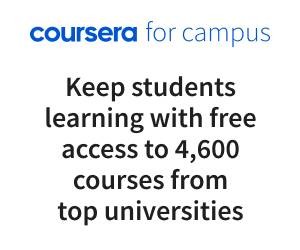The Covid-19 pandemic has reinforced the importance of digital skills – not only for students but for education providers as well
The impact of the Covid-19 pandemic across the world has been profound. The outbreak has exposed a pre-existing digital skills gap and emphasised the importance of embedding career skills within higher education institutions.
At a webinar hosted by Times Higher Education in partnership with Coursera for Campus, experts from various higher education institutions based in the EMEA region provided insight into how the past 12 months have sharpened their focus on digital skills, particularly regarding career development.
Chantelle Murray, head of the human resource development unit at the University of the Witwatersrand in South Africa, started the discussion by addressing the fact that social inequality had made the jump to digital learning particularly difficult. “We've had to think about strategies within the university to make devices and data available as a starting point before we even start thinking about exactly what we are covering and addressing in terms of learning,” Murray said.
Of course, it’s not just learning that has been transformed by the pandemic. The world of work has also embraced digital tools, something that Andrey Sozykin, head of the high-productivity computer technologies department at Ural Federal University, believes future job applicants may adapt well to. “With respect to career development, I think the transfer to online learning may actually be beneficial in some cases because many of our partner IT and industrial companies have shifted to remote work and many do not want to return to the office,” he said.
For universities, the transition to remote learning has relied heavily on forging partnerships with digital platform providers. Coursera, an online course provider that works with higher education institutions to deliver courses, certifications and degrees in a variety of subjects, has proved particularly supportive. Péter Szakál, director of academic affairs at the University of Szeged in Hungary, described the platform as having provided a “life jacket” when lockdowns were imposed.
Anthony Tattersall, vice-president of the EMEA region at Coursera, has noticed a clear shift in students’ decision-making criteria as a result of the Covid-19 pandemic. “I think a university education is a hugely powerful thing for an individual to have, but the institutions that are combining a traditional form of university education with a focus on developing job-ready skills are the ones that have the highest career outcomes for their students. This is becoming a more important factor for students.”
All the panellists agreed that digital skills were essential for students embarking on their career path – something that the pandemic has only cemented. However, universities found that they were not always prepared to lead this digital transformation. Murray said that it had “been a huge learning journey within a very stressful climate”.
The changes to the education sphere have been profound, but the impact of these changes will not be fully revealed for some time. Education has continued throughout the pandemic, but the data are not yet available to determine how well universities have managed the digital shift in terms of the skills being taught and career outcomes for students. Szakál did state, however, that one short-term outcome seems to be that students are becoming “more experimental” in choosing their own study paths.
When historians look back at this period, they will find that the education sector reacted admirably to the Covid-19 pandemic but that missteps were made. Sozykin told the panel that one of the biggest challenges facing his university centred on enabling collaboration. He said that higher education institutions must find better ways of “working with Coursera, other universities and industry partners”. It’s a challenge facing universities across the EMEA region and beyond, and one that will shape the future of education for years to come.
Watch the webinar on demand above or on the THE Connect YouTube channel.
Find out more about Coursera and higher education.










































































